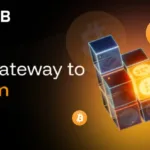SINGAPORE — An important story in crypto proper now could be tokenization and it’s coming quick to disrupt conventional finance, in accordance with Robinhood CEO Vlad Tenev.
Tenev instructed the gang on the Token2049 convention in Singapore that tokenization is a “freight prepare” barreling towards the guts of conventional finance.
“Crypto and conventional finance have been dwelling in separate worlds, however they’ll totally merge. Sooner or later, every part can be on-chain in some kind, and the excellence will disappear,” he stated.
With Robinhood now providing tokenized shares in Europe in addition to non-public shares in among the hottest personal startups like OpenAI, the agency is betting huge on a future the place property commerce 24/7, on-chain, and globally.
“In the identical manner that stablecoins have grow to be the default solution to get digital entry to {dollars}, tokenized shares will grow to be the default manner for individuals exterior the U.S. to get publicity to American equities,” Tenev stated on stage. “That’s why we launched our inventory tokens in Europe first, it’s the way forward for how international traders will maintain U.S. property.”
Although many within the crypto business have praised the course the U.S. is occurring digital asset coverage, Tenev stated the nation must play regulatory catch-up to Europe.
There isn’t any urgency to vary issues – comparable to creating rules to facilitate 24/7 buying and selling of tokenized shares – as a result of the present system works properly sufficient already. Tenev in contrast it to the shortage of high-speed trains within the U.S., one thing ubiquitous in Europe and Asia.
“The largest problem within the U.S. is that the monetary system principally works. It’s why we don’t have bullet trains — medium-speed trains get you there properly sufficient,” he stated. “So the incremental effort to maneuver to totally tokenized will simply take longer.”
Tokenizing actual property
Subsequent up for Robinhood is tokenizing actual property.
Tenev instructed the gang that tokenizing property is “mechanically” no completely different from tokenizing a personal firm, comparable to SpaceX or OpenAI: you place the property into an organization construction after which concern tokens in opposition to it.
Whereas OpenAI known as the transfer to tokenize its non-public shares “unauthorized” and crypto attorneys that spoke to CoinDesk stated the transfer walked a authorized tightrope, Tenev dismissed the controversy as a part of a broader regulatory lag, arguing that the principle hurdles aren’t technical however authorized.
Europe is already shifting forward, he stated, whereas the U.S. will doubtless path, however he framed actual property as the subsequent logical step in Robinhood’s tokenization push — an asset class that would in the future be traded as simply as a inventory or stablecoin.
“Finally, it’s going to eat all the monetary system,” Tenev stated.








